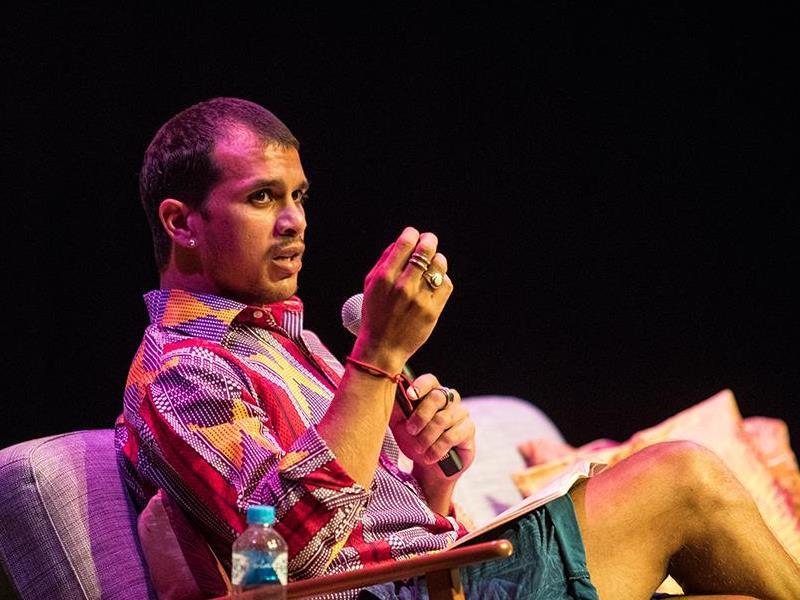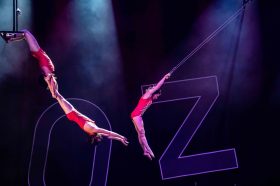Gus Fitzgerald at SPUN. Photo credit: Justin Kennedy.
‘There’s something very powerful about stripping everything back, seeing the story and being up close to the storyteller,’ said Johanna Bell, the Creative Director of Darwin’s live storytelling event, SPUN: True Stories Told in the Territory.
‘There’s no barriers, there’s no screen, there’s no audio enhancement, and there’s no bells and whistles.’
A recent SPUN story on parental loss and the struggle for approval, told by young indigenous man Gus Fitzgerald, is a sterling example, says Bell, of a story where the storyteller’s vulnerability and openness really resonated with the audience.
‘Gus is an Aboriginal guy in his 20s, he’s covered in tatts and to look at him, you’d never expect that he would take the emotional risks that he did,’ Bell said.
‘His story was very relatable because it covered themes relating to the lack of parental approval and the premature loss of a parent and the effect it had on him.
‘It was the first and only time we’ve ever seen a standing ovation at SPUN. There were 250 people and they all stood when he got off the stage. You could feel the impact in the room; it was goosebumps, hair standing on end. We’d all just seen an incredible moment in a man’s life.’
SPUN began in Darwin three years ago and has grown steadily.
‘The idea for SPUN came to me when I was living in Katherine,’ Bell said. ‘It’s a divided community that is very diverse with lots of pockets of people who don’t overlap. I could see that there were love stories, survival stories, funny and sad stories and I thought: “What would happen in this town if someone from all those groups shared a story? We could bring everyone together.”’
When SPUN‘s first event drew a crowd of 250, surpassing expectations, Bell knew she was onto something special.
‘We realised there was an immense appetite for personal stories. For me, part of the challenge is the times we live in, which are highly curated and you see this most on social media. This pressure to keep up appearances is more extreme now, I think, because we’re able to pick and choose how we look across a bunch of different platforms.
‘I think that’s created a real yearning for authenticity; real people telling real stories and by that I mean making themselves vulnerable in a lot of different ways, Bell said.
‘Sometimes it’s showing emotion, sometimes it’s admitting to something that they’ve been really shameful of or sometimes it’s even cracking a joke on stage that doesn’t go that well. There’s different ways of being vulnerable in front of an audience.’
Read: Why we need sensitivity, generosity and kindness in the arts
Like Bell, Merrilee McCoy, the Melbourne producer of The Moth’s storytelling event, StorySLAM, believes there’s an appetite for interaction that takes the focus off technology.
‘I think events like The Moth have grown in popularity as a response to the increasing disconnection to community that people feel in the digital age,’ McCoy said.
‘We think we’re more connected because of social media, but all the research says this isn’t “quality” connection. We need conversations in real life. We need community – people to care about and feel connected to.’
Authenticity in Australian storytelling
Both women agree that the way Australians tell stories differ remarkably from American culture and that this is linked to both ego and our reluctance to put ourselves front and centre.
McCoy said her observation is that Australians are less inclined to immediately go deep with their stories.
‘I think Aussies lean far more towards self-deprecation in place of true vulnerability and Americans have a different cultural narrative about self-confidence than we do,’ she said.

A participant at a StorySLAM event. Photo credit: Karin Locke.
Bell believes many people are dissuaded from telling stories because of a tendency to indulge in tall poppy syndrome – the inclination to disparage or resent those with a high status.
‘I describe tall poppy syndrome as a type of scurvy in the storytelling world,’ Bell said. ‘It’s hard to see, but if you don’t see it, it kind of slowly corrodes the storytelling culture. You’re not to blow your own trumpet or you’re assuming that you’re better than anyone else.
‘And Americans don’t have that challenge,’ she notes. ‘The ‘I’ is already very big in American storytelling. We’re a lot more subtle in many ways. We are reluctant to reveal internal dialogue, feelings and thoughts.’
So how can we change our storytelling landscape?
Bell said: ‘The shift I would like to see is more media organisations investing in pre-production rather than post-production.
‘In Australia we tend to compensate for this reluctance to insert ourselves into our own story by over-editing. We’ll capture all this content and we’ll cut people up and make them sound as good as they can – wonderful. But if you flip the resourcing model around and have people being supported to value their stories and acquire the sort of story-craft skills to tell their own stories, then we can create opportunities for a cultural shift and empower people from really diverse backgrounds to share their stories and create a much more colourful and exciting storytelling landscape.’





